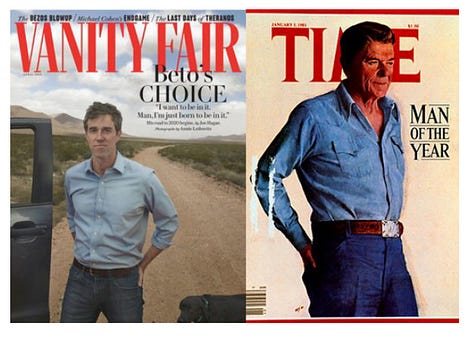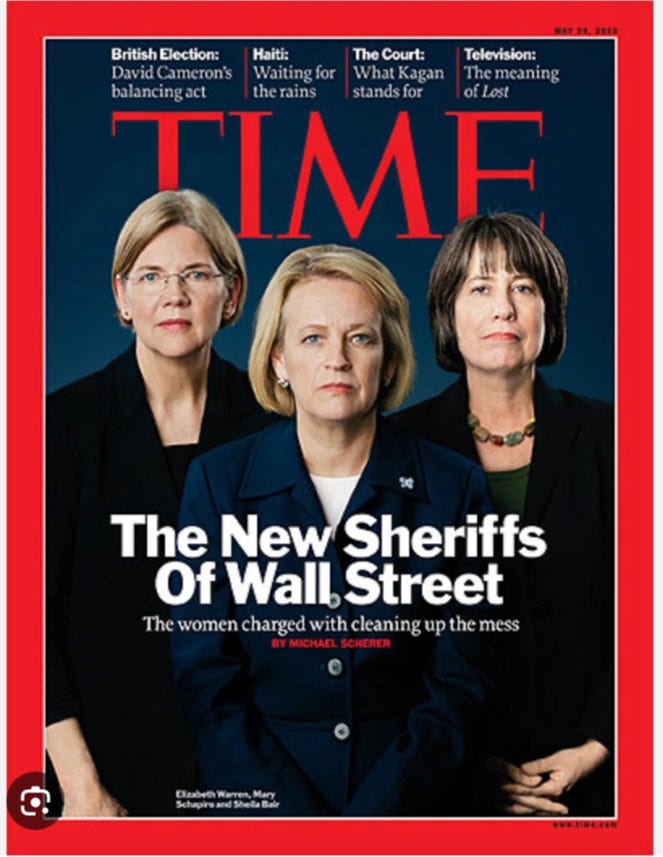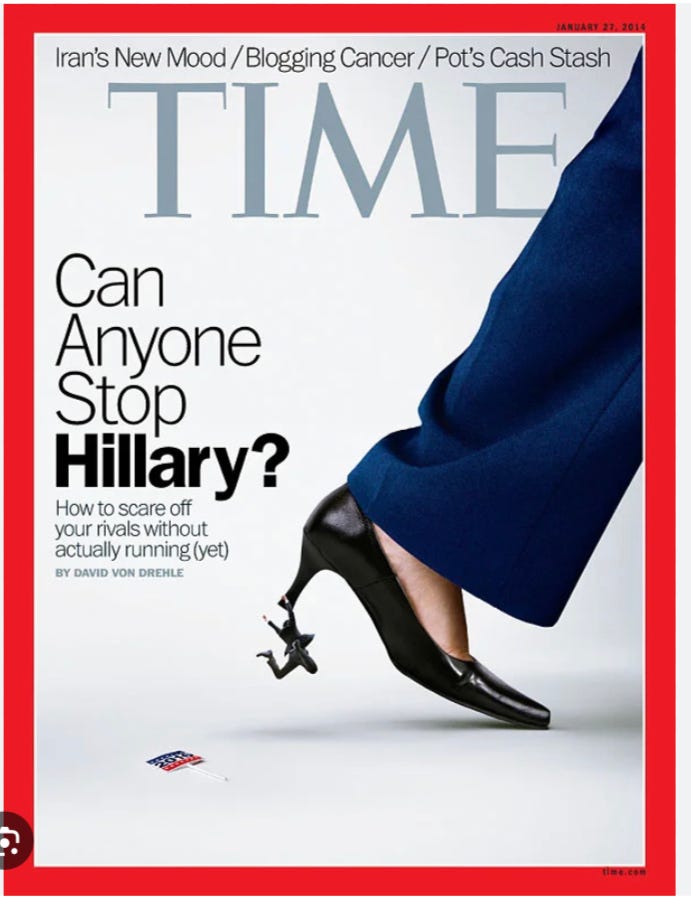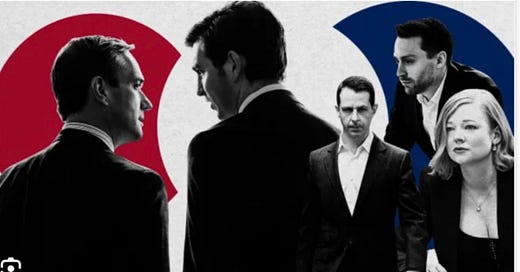“Succession” and Reality
A joint “TV Watch,” “Politcal/Media Potpourri” and “Feminism is for Everyone and Always” post
Sunday’s Succession episode, “America Decides,” marks an eerie full circle moment for the HBO series as it prepares to close its fourth and final season. Almost seven years ago the cast and crew had their pilot table read on Election Day 2016; that evening, many of the team members gathered at the home of series executive producer Adam McKay for a party that was expected to celebrate the presidential victory of Hillary Clinton.
But as numbers came in favoring Donald Trump, the party’s mood took a turn. “I remember everyone getting quieter and quieter and quieter, and then people just started leaving one by one,” says Andrij Parekh, the Emmy-winning Succession director who helmed “America Decides” and served as cinematographer on the pilot. “It felt more like a funeral and a mourning than anything else.”
In a phone call with VF, Parekh says he drew on that tonal memory when directing Succession’s big election night episode, as many characters come to realize in horror that fascist candidate Jeryd Mencken (Justin Kirk), with his white supremacist leanings, could beat Democratic candidate Daniel Jimenez (Elliot Villar) and become the country’s leader. Says Parekh, “It was a good place to start in terms of the reality check of it all.” (“Yes, Succession’s Election Episode was Inspired by Trump” Vanity Fair, May 14, 2023)
“Things Do Happen”
I’m in Chagrin Falls, Ohio, and it’s 4 a.m. the morning after Donald Trump’s inauguration. I live in Lexington, Kentucky, but my daughter is temporarily here in Chagrin Falls and I’m visiting her, in a tiny above-the-garage apartment. Chagrin Falls is an upscale, quaint town, with a picturesque waterfall in the center of town and charming boutiques and restaurants on both sides of the resort-like village center. It’s a very “white” town. My daughter tells me that people often stare at her when she goes into the local Panera to have her morning bagel and do her homework; she’s usually the only Black person in the place.
When I arrived, a couple of days before the election, scouring the house numbers, looking for the right one, my heart sank when I saw row after row of “Trump/Pence” signs on the lawns of house after house. My own Hillary sign had been twice confiscated from my front lawn in Lexington; would I now have insult added to injury by having to stay in a Trump house? But no—for the time being, the gods were with us: the house we were staying in was the only one on the block with “Hillary/Kaine” prominently displayed.
On election night, my best friend had travelled there to join me. “No one should have to watch the election alone,” she said. I was so happy to have her there! My daughter was off with her friends, and I was extremely nervous; I’d been following the election closely, posting pieces in Huffington Post and planning a book. I was in a state of constant fury over James Comey, media coverage, Bernie Sanders, the polls, and the distorted picture of Hillary Clinton that had made her chances so much more tenuous than they should have been. But I still expected her to win. As did the creators of Succession. It seemed unfathomable that Donald Trump should become our president.
Unfathomable. But it happened.
Unfathomable: All the horrors of the Trump years. But they happened.
Unfathomable: That Trump continues to be the Republican favorite for 2024. But it’s happening.
Many people describe being “triggered” by the Succession “American Decides” episode. Others have mocked those of us who couldn’t sleep after the episode. I guess they aren’t aware of how much the writers of the show were themselves influenced by the real-life “unfathomables” that came to be American realities, and how hard the writers worked to present a believable scenario in that episode.
It’s precisely the believability of the episode that was so triggering. We’d been there on actual election nights. Different players, different machinations. But the same “genres”: media malpractice, craven decisions, disregard for fact, for honesty (and in the case of 2016, sexism) that decided our fate. We came to Succession remembering exactly how it felt to begin a night with a bowl of popcorn and hope, only to go to bed (or not be able to go to bed) crushed and disbelieving, not just by the defeat but by the insanity of it.
The insanity. Succession gets it so chillingly right. The untethered ambition. The way huge events turn on the emotions of a moment. The capitulations to the loudest voices. The way experts like Darwin give up whatever power they have to a squeaky but domineering Roman. The (actual) fact that “it all comes down to a handful of states.” The “I can’t believe this is happening” look on Shiv’s face as she hears ATM calling the election for Mencken. The insanity of a couple of rich boys who want their daddy’s power but lack their daddy’s “seriousness” deciding the fate of a nation. The look on Jess’s face as Gregg goes off to tell them to announce for Mencken. The fact that Gregg—totally unhinged, totally cagey—plays such a key role in firming up floppy Kendall to go along with wildly out-of-control, infantile (“I wanted steak but we always had chicken”) Roman. Ravenhead talking pitch-perfect Fox: (“We'll figure it out, and issue you with your new government to march into your homes and take whatever we want in the way of your mechanisms of self-defense, and tell your son she's actually your daughter, or the other way around…that you can't go out at night, and the new president is opening up his borders to his friends…”
“America Decides” captures it all so perfectly. And as with every other episode, a lot of it is cleverly, humorously entertaining. “Four smileys” from Gil versus “Eggplant, Eggplant, flag” from Mencken. Wasabi in the eyes treated by Greg with lemony bottled water (“It’s La Croix!”—undoubtedly the funniest scene in the episode.) Connor telling his “Conheads” (do they even exist?) that their time will come. (Hugo: “Connor was running for president?”) The huge kerfluffel over the malfunctioning touchscreen. The ridiculously chaotic (but hugely consequential!) debates about who “makes the call.”
Succession is a satire, but like the best satires, it cuts deep and true. “Things do happen. Rome.” Shiv says. Yes they do, girl. They have.
*****************************************
The next morning after the 2016 election my best friend and I had a fight that had nothing to do with the election and everything to do with election. We ended up sobbing in each others arms. After she left, I sat numb for several hours, then received an unexpected gift: an invitation from Die Zeit to write a piece of any length I wanted on my reaction, as a feminist, a cultural philosopher, and an American, to the election. The piece ultimately became a book, The Destruction of Hillary Clinton, that I’ve been told by readers channeled the thoughts and feelings of many.
In that book, I detail how right-wing scheming, the industry in Hillary-hate publications, the Bernie Sanders factor, gendered double-standards and double-binds, and the interference of Jame Comey fed into the (unfathomable) outcome of the election. But throughout the book, I also had strong criticism of the mainstream media, who served as a conveyor-belt and mass disseminator of everything that got thrown onto the radar screen, no matter how ill-founded. Giving “bad optics” the prominence of established fact, lazily fitting every news story into the “narrative” of “untrustworthy Hillary,” paying more attention to the content of every leaked email than the much more significance story of the Russian origin of the leaks, continually declaring “momentum” for Sanders and Trump and “lack of enthusiasm” for Hillary (who did, after all, overwhelmingly win the popular vote), and giving enormous free air-time to the big rallies and big crowds rather than Clinton’s more low-key campaigning—these are just some of the ways in which the mainstream media, both networks and cable news, contributed—significantly, and not yet admitted by them—to the outcome of the 2016 election.
Writing the book gave me purpose, but I didn’t recover—still haven’t recovered. How could we have recovered? The reality of what happened and the consequences of it haven’t been exorcised from our psyches because none of it is over. Because the disorder still ravages America. And to those who are offended by the use of clinical terms like “PTSD” in connection with the “America Decides” episode of Succession, I say: What country have you been living in?
The morning of Trump’s inauguration, I listened to his speech. It was frightening at the time, but is even more so now that we can see it in the light of the authoritarian regime it was designed to justify. As I post it now, I feel that I may as well be posting the speech of a Hitler. Or a Mencken (recall how the episode opens with his voice in the background: “Sleepwalking into oblivion. Uncontrolled migration, hyperinflation, rampant crime, cultural Marxism...”)
“Mothers and children trapped in poverty in our inner cities; rusted out factories scattered like tombstones across the landscape of our nation; an education system flush with cash, but which leaves our young and beautiful students deprived of all knowledge; and the crime and the gangs and the drugs that have stolen too many lives and robbed our country of so much unrealized potential.”This American carnage stops right here and stops right now.”
While Trump delivered his speech, Barack Obama clapped politely, his face betraying nothing of whatever his true thoughts were. He had decided this was the responsible thing to do, and as I love and respect the man, I have no argument with anything he did during that surreal, terrible event. But when, later in the day, I saw pictures of Michelle Obama and Hillary Clinton, Michelle visibly angry while Hillary looked up at her in silent communion and sisterhood, I was grateful to have reality visible on their faces. So very different in personality, appearance, and experience, they nonetheless seemed one—in shared knowledge, pain, and endurance beyond imagining. During the long, awful day, my thoughts kept coming back to them and what they must be feeling. Michelle and Hillary: they were a counter-inauguration in my brain, my heart.
Shiv and the Problem of Female Ambition
No one is an angel in Succession (to put it generously.)
But no one is the object of as much fan-vitriol as Shiv. People on Succession Facebook Fan Pages continually single out Shiv as uniquely awful. Some were gleeful when Kendall “told her off” in the last episode, having found out that she lied to him about her alliance with Mattson. “I’m so glad that lying, manipulative POS was exposed” one of the “fans” of the show wrote, conveniently ignoring that before Shiv teamed up with Mattson, her brothers had over and over betrayed their promise to be a triumvirate. They had even sworn to it on their father’s death. From “Honeymoon States”:
Kendall: “I'm not trying to fսck anyone, okay? This is just to sell, and yesterday was... Come on. Like, yesterday was fսcking... That was real. And I think we're... I feel really good about this. This is... I think this is good.”Kendall: “I'm not trying to fսck anyone, okay? This is just to sell, and yesterday was... Come on. Like, yesterday was fսcking... That was real. And I think we're... I feel really good about this. This is... I think this is good.”
Roman: “Everything. Yeah.”
Kendall: “Yeah. It's a holding position. It's holding. We'll do the deal. Spin ATN, fold in Pierce. Six months, eight months. And that's all equal?
Roman: “Yeah. Equal as fսck, to the gram.
Shiv: 'Cause you guys fսck me on this, and it's…
Shiv: “This is a Dad promise. On yesterday?”
Roman: “Yeah. On yesterday. On yesterday. Not gonna fսck you.”
In “America Decides,” Shiv tries to remind them of their breaking of that promise. ( “I was going through with the plan. And then you two...”) but Kendall is having none of it. He tells Tom to call the election and Tom, oblivious to Shiv’s pleading or the implications for the country (or the station, which is likely going to lose credibility) does.
Like Kendall, the Shiv-haters are obsessed with Shiv’s “lies” and seemingly unconcerned about the much more consequential, craven lies of her brothers. Were they out getting some bodega sushi when Kendall promised his Indian daughter that he’d protect her and then helps elect a racist? “Tell Sophie I love her and that’s’s why I do everything I do. …I love you sweetie, okay? Nothing’s gonna happen. Exit polls say Jimenez, okay? I won’t let the world push you, okay, sweetie?” Talk about lies!! And this one was to a little girl. The fact that Kendall is “tortured” doesn’t change the fact that he’s ready to sell his country (and his daughter) for the sake of ambition—or worse, because he feels “betrayed” by Shiv.
Shiv-haters lavish sympathy on Tom when he accuses Shiv, during their big fight at the end of “Tailgate Party,” of offering him up as the sacrificial lamb for the cruise ship scandal. They apparently don’t remember how she privately went to Logan and begged him: “Please, for me, anyone but Tom.” They castigate her for every hurtful thing she’s said to Tom (and there have been plenty) but let him off the hook for spitting out the two most cruel comments delivered by anyone, throughout all the seasons: “You’re one of those people who shouldn’t have children” and—far worse, in my opinion—“you sort of killed your father.”
What makes those so vicious is that Shiv believes them (or at least, frets about them) herself. Her own mother—truly a mom from Hell—has said much the same thing to her about being a mother, and Shiv tells Tom (sitting on the stairs the day after Logan’s death) that she trying to accept the fact that she and her brothers have killed their father.
Shiv-haters also like to focus exclusively on Shiv in her relationship with Tom, while ignoring the fact that she behaves with far more “seriousness” than her brothers in her business dealings. And although she is as self-interested as everyone else in the series, it happens that her self-interest coincides with what’s better for democracy. She’s likely right, too, that the call for Mencken will prove disastrous for the station.
Roman: “We’ll be in the West Wing. Nothing matters, Ken. Nothing fucking matters. Dad's dead, and the country's just a big pussy waiting to get fսckеd.”
Shiv: “Whatever advantage to us as... as... as corporate players in the short term... You know...He's... Mencken's the nightmare, yeah? Plausible in a decadent era. He says the bad shit, he believes the bad shit.”
“….and in a... in a month, a week from now, the courts go the other way? It's... We're essentially done as a news organization.”
The Shiv-haters don’t believe her, of course, when she professes to be acting in the best interests of the country. They’re forgetting that when we first are introduced to Shiv, she’s working as a Democratic political operative, and is mocked by others in the family for being a “liberal.” Yes, she makes strategic “plays.” Yes, she considers the effects of various scenarios on herself. Yes, she’d like to be CEO. But that’s true of her brothers, too, and they are willing to help elect a fascist to achieve their ends. People who call Shiv a POS while shedding tears over Kendall and cheering him for telling her off…well, I don’t know what century you are living in, that you should find a woman’s ambitions so disgusting while forgiving her far more ambitious, deceitful brothers.
Unfortunately I know what century you’re living in. It’s the 21st.
Again, at the risk of torturing people with bad memories, let me take you back to a couple of previous elections. I’ll start with Shattered, a book that came out a few days after my own. Written by Jonathan Allen and Amie Parnes, media-insiders and familiar faces on MSNBC, it’s a "tell-all" about the "inside" of the 2016 campaign, and spends an inordinate amount of time describing how nasty Hillary was to her staff. No mention of the media. Scant mention of Comey. Russia a passing aside. Sexism? Barely discussed, but frequently exhibited.
That “she didn’t apologize” soon enough or extravagantly enough is Shattered’s entire diagnosis of why the email “scandal” continued to dog Clinton. “For months, she tried every approach but confession and contrition,” remaining in “denial” about the “fact that she had not told the truth about not sending or receiving classified information” and instead castigating her staff in a “severe, controlled voice” that “crackled” through the telephone line for not “burying this thing.” In fact, Clinton had told the truth, as James Comey himself admitted under questioning by Congressman Matt Cartwright, who produced a copy of the State Department Manual, according to which the emails in question were not properly marked — just as Clinton had been saying. But forget the facts of the matter; just give us that “contrition”! Won’t you bow down and “confess” all — and then perhaps we will forgive you your sins.
Just what were her sin? Not “likeable,” not servile enough, too sure of herself. Uppity.
Annoyance with Clinton for being too uppity plagued her from the beginning of her public life, when her feminism was caricatured as looking down on housewives and Tammy Wynette, somehow thinking that Clinton had sneered at her by referencing her song “Stand By Your Man” in describing what she wasn’t doing in defending Bill, took personal offense. As First Lady, she was deemed by conservative commentators as that most “unnatural” of creatures: an ambitious woman. She wanted an office in the West Wing! She tried to put through a plan for universal health care! She only had one child! She sneered (or so we were led to believe) at women who stayed home to bake cookies and serve tea. These crimes earned her epithets like “The Lady Macbeth of Little Rock” and “The Yuppie Wife from Hell”; a New York Post cartoon pictured Bill Clinton as a marionette, with a ferocious Hillary pulling the strings. (Is Shiv started to appear at the corners of your imagination?)
When the Clintons left the White House, Hillary had been battered and bruised enough to earn the right to run for Senator of New York State, an office in which her productive but low-key performance earned her praise. She was now doing what women are supposed to do: graciously “serving” as a junior senator who underplayed her celebrity and deferred to those with seniority. Even Republicans seemed to like Hillary when she was doing that. When she left the senate, she was commended by politicians on both sides of the aisle for her compassionate service to New York during 9/11 and her ability to work with Republicans as well as Democrats. And as Secretary of State, she served President Obama (to whom, let’s not forget, she lost her first presidential run) so dutifully, was such an exemplary public servant and team player that she had a 69% approval rating — ”remarkably high numbers,” Nate Silver noted, “in an era when many public officials are distrusted or disliked.” In 2014, John McCain remarked, “If the election were held tomorrow, Hillary Clinton would most likely be the President.” (The New Yorker, March 10, 2014)
But as her friend and former congresswoman Ellen Tauscher had warned her before she left State, that would all change once she actually entered the ring. “The moment you move back into politics,” Tauscher had said, “you go from 66 to 46 to 26 faster than a split second.” In April 2015 Hillary announced her candidacy, and within weeks, John McCain’s prediction was replaced by the press with an annoying “presumption of inevitability”; the pundits used language like “annointed,” as though she thought herself a queen, had the nerve to aspire to a throne.
Uh-oh. She was “leaning in” again (Facebook COO Sheryl Sandberg’s phrase for women pushing against the professional limits placed on them.) And the “hellish housewife” (as Leon Wieseltier called her) was reincarnated, this time without the “housewife” part. Not surprisingly, the right-flank led the charge: Hillary was “Satan”(Don Imus), “Mommie Dearest,” “the debate dominatrix” and “Mistress Hillary “ (Maureen Dowd.) But it wasn’t just right-wing journalists and pundits. MSNBC’s Chris Matthews, then an ardent Obama supporter, described Hillary as a creature from the bowels of hell: “witchy” and a “she-devil.”
GOP colleagues began to alchemize everything good that she had accomplished while serving her country from gold into ashes. Her tenure as Secretary of State became “Benghazi” and then “the Email scandals.” Among self-identified “progressive” Democrats, her years of experience trying to find common ground in a highly polarized government became evidence of her enmeshment in “establishment politics.” Her ability to moderate between progressive goals and the necessities of working within a consumer capitalist society (yes, like it or not, that is what we are) became “being in the pocket of Wall Street.” And every time she tried to explain — anything — she was branded as “lying,” “deflecting,” “covering up.”
This construction of Hillary Clinton was so relentless, so embedded in virtually every story about her, that it made no difference whether you were watching Fox News or MSNBC — unlikeable, untrustworthy, deceptive, lying, even “criminal” Hillary was all you were going to get.
Was it any better for the women who ran in the 2020 election? Marginally, perhaps. With less venom, perhaps. But:
When Warren was running for the Massachusetts senate, she had to deal with charges of being “harsh” and “unlikeable.” Other women were “turned off” by Warren’s “know-it-all style”, and she was charged, like Clinton, with “inauthenticity.” “I want her to sound like a human being,” said a democratic analyst for Boston radio station WBUR, “not read the script that makes her sound like some angry, hectoring school marm.”
In the 2020 primary, the media was decidedly lopsided in its treatment of male and female candidates. When the candidates first announced in 2019, weeks of serial salivating over male “charisma” went by without a mention of the ground-breaking policies—on childcare, education, taxes, health-scare—that Harris, Warren, Gillibrand, and Klobuchar regularly proposed. But the vaguest promise of bitchy gossip and the headlines popped up: “Kirsten Gillibrand Still Struggling to Make any 2020 Friends,” “Kamala Harris Hasn’t spoken to women who filed sexual harassment law suit against ex-aide,” and of course the iconic “How Amy Klobuchar Treats her Staff” in which the New York Times excoriated Klobuchar for “losing patience” with an aide for failing to supply her with a plastic fork for her salad. “What happened next was typical: Ms. Klobuchar berated her aide instantly for the slip-up” and after improvising with a comb, “handed the comb to her staff member with a directive: Clean it.”
So among the women candidates we find a prosecutor who loves putting people in jail, a mean boss who eats salad with a comb, and a pretender to ethnic status who some have described as a hectoring schoolmarm. Funny how I hadn’t seen any such stories about...you know...the men.
The double standard regularly pops up on magazine covers. Think about the various recognizable, appealing archetypes we have for male politicians. There’s the laid-back cowboy (a la Reagan and Beto): Outdoorsy, unstuffy, happier on a horse or the road than in a library. No East Coast elitists here. There’s the working-man’s man; down-to-earth, shirt sleeves rolled, ready for the assembly-line. Bernie and Biden currently hold the patent on that one. There’s the civilized gentleman: suited, urbane, and smooth. Call it the Kennedy paradigm. Reagan’s talent was to move effortlessly between cowboy-manliness and ex-actor glamor, And Obama perfected his own brand, countering racist archetypes by becoming the King of Cool.



These archetypal images tell us, among other things, that for men, leadership is not just compatible with masculinity, but requires masculinity. We don’t have any comparable iconography for the female leader. Instead, she always stands in the shadow of the male paradigm, with an inevitable suit and some version of smoothly straightened hair. But encroach on male territory in more than symbolic ways, and something is felt to be amiss, against the natural order. A famous Time cover headlined “Can Anyone Stop Hillary?”, shows a dangerous high-heel emerging from a pant-suited leg, about to stomp on a tiny—but clearly male—figure. And although Hillary is, arguably, a special case, a screen on which every anxiety, resentment, and rage against the woman who claims her power was projected in high definition, cultural retribution for memories of controlling moms and nagging wives wanting the garbage taken out—the visual trope of the grim, scary, “leaning-in” woman is not unique to Hillary


“The New Sheriffs of Wall Street”—another Time example, from 2010 shows Mary Schapiro, Sheila Bair and Elizabeth Warren grimly staring out at the imagined viewer. These women are killers, it tells us. And when a record number of women ran for office in 2018, Time’s cover labeled them “The Avengers.” The first “big” piece I saw about Kamala Harris described her as “militarily on point”” “All good politicians stick to a script, but Harris speaks like a woman who knows that facts are ammunition.”
Am I making too much about some harmless metaphors? Maybe. But I remembered the piece and the metaphors later, after the second debate, during which Kamala sharply rebuked Joe Biden for his earlier stand on bussing. Invoking her own history as a little girl who stood waiting to be bussed across town, Kamala both disarmed and charmed. The result was an initial surge in ratings and funding. But Joe Biden was beloved by many older Democrats, particularly older blacks, and Kamala was so…uh…aggressive. It didn’t take long for the image of the Mean Prosecutor, viciously “attacking” Uncle Joe (the word “attack” came up time and again in the press) to supplant sympathy for the little girl.
Shiv was once a little girl, too. Can you imagine what life was like for her, as a girl growing up in a household that disdained “pussies” and celebrated male aggression and ambition—so long as they were exhibited by actual males?
And should I be amazed at the Shiv-hating on “Succession” fan pages.?








It is painful to remember. I'm not sure I ever recovered from 2016. The disillusionment, the fear, the loneliness -- the morning the results were in, I walked to my mailbox feeling like the world actually looked ever so slightly different, the light, the trees, the asphalt. I felt shaken. It's really amazing how a well-written and well-acted television drama can re-evoke some of that feeling. Kudos to all who created it. Because as Shiv says, "Things do happen." As far as characters, it is crystal clear that Shiv is the only one with real liberal leanings. Roman, who I had grown fond of, is truly a monster unleashed from his father's presence. And Kendall? Dissociated and confused. Susan Bordo recommended a podcast that I did listen to yesterday - with the writer and consultants. They'd been through real elections. Was it realistic? They were asked. "Yes." Maybe not the station head "making the call," but mostly everything else! It's painful, but important to remember. Trauma causes helplessness and numbing. The Succession episode broke through that. Briefly. That the boy/king is running again and gaining media coverage is horrifying to me. Anyway, I looked forward to this piece because as I felt when I first read "The Destruction of Hillary Clinton," I knew Susan Bordo would break it all down for me as she did then.